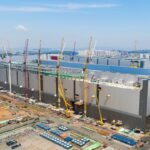
There is endless competition between Samsung and TSMC. When it comes to next-gen manufacturing technologies, Samsung has an upper hand over TSMC. According to reports, the production of the 2nm process of TSMC has been impacted by economic conditions. It indicates that Samsung could beat its competitor in this respect.
Similar to how it was the first to mass-manufacture 3nm solutions, Samsung may be the first chipmaker with the ability to produce 2nm processors. Observers of the market are now debating whether they overestimated how long it would take TSMC to build its 2nm chip manufacturing facility in Baoshan, Taiwan. It might take longer for the plant to become operational, and the South Korean tech giant Samsung can take advantage of this situation.
Industry observers predicted that the Taiwanese semiconductor giant would be ready to start mass-producing chips based on the 2nm process in the first quarter of 2025 because of TSMC’s rapid progress towards 2nm chip manufacture. Given the low demand for chips, the company slowed down its operations at Baoshan.
According to industry sources, the company will postpone 2nm chip production beyond the established timeframe. For this reason, the original roadmap is no longer an indication of the progress of TSMC towards 2nm chips. The company won’t be prepared to mass-produce 2nm chips in early 2025. However. TSMC will likely have a production limit of 30,000 2mn wafers by Q4 2025.
On the other hand, Samsung will begin mass production of 2nm-based chips in 2025. Additionally, it hopes to be able to produce 1.4 nm-based semiconductors by 2027. In addition to this, the South Korean conglomerate Samsung has expertise in GAA (Gate-All-Around) technology. GAA can be helpful in producing high-efficiency chips. Samsung has already used GAA technology with the 3nm chips.
Research Snipers is currently covering all technology news including Google, Apple, Android, Xiaomi, Huawei, Samsung News, and More. Research Snipers has decade of experience in breaking technology news, covering latest trends in tech news, and recent developments.